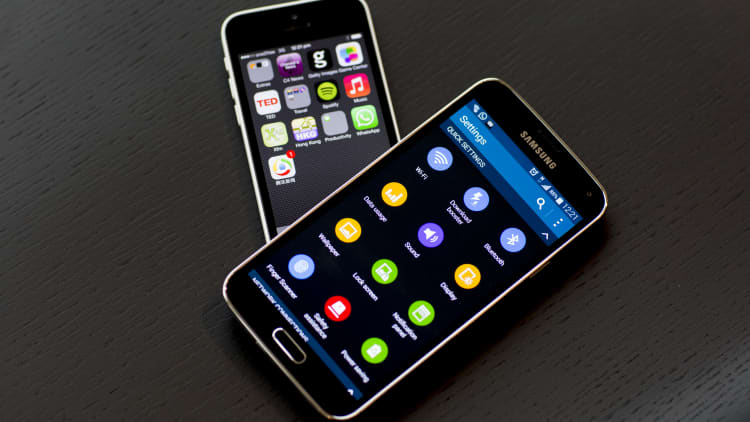Apple and Samsung's market share is set to decline and not even the hotly-anticipated iPhone 6 or wearable tech can stop the slide as price-conscious emerging markets become increasingly important, according to ratings agency Fitch.
Samsung's global smartphone market share will decline to around 25 percent from 31 percent last year, while Apple will see a small drop from 15 percent in 2013 to 14 percent this year, the agency predicted in a report.
A combination of rising competition from low-cost local players in emerging markets and saturation in developed markets will hit the two smartphone giants, Fitch warned.
"The decline will be due largely to rising competition in emerging markets, where lower-priced handset models from local competitors should continue to gain market share at the expense of the big two," the ratings agency said in a statement.
Read More'China's Apple' knocks Samsung off top spot in China
"In these markets, where cost is relatively more important than global brand strength or cutting-edge technology, competitors' devices retailing at $100-$300 can offer most of the key features of more expensive phones from Samsung and Apple."
iPhone 6 'not revolutionary'
The big two companies' combined smartphone shipment volume will "stagnate" at around 450 million to 460 million units in 2014, down from 467 million in 2013, despite the global market expected to rise by around 20 percent to 1.2 billion, Fitch said.
Both Apple and Samsung are betting on new products to maintain dominance in mobile device market.
Apple is widely expected to release the iPhone 6 in September, while Samsung is rumoured to unveil another smartwatch in its Galaxy Gear range.
Read More'China's Apple' lays down challenge to iPhone, Samsung
But Fitch said that this would not be enough to save the technology giants' eroding dominance.
"Apple's next iPhone…is likely to have a larger screen, and developments are likely to be incremental rather than revolutionary. We believe that the innovations - which include curved screens and compatible wearable devices - are unlikely to change the trend facing Samsung and Apple," Fitch said.

Apple acknowledged that it faces "substantial competition" in its market in a Securities and Exchange Commission filing in July.
Emerging market competition
Samsung is facing stiff competition from local brands in countries such as China and India. The South Korean electronics giant , citing slowing smartphone sales growth.
"Prospects for growth remain unclear as competition over global market share intensifies in the mobile industry," Samsung said in a statement in July.
Read MorePriceline earnings lesson for Apple investors
Samsung was overtaken by Chinese upstart smartphone maker Xiaomi as the number one smartphone vendor in China in the second quarter, according to research by Canalys.
Fitch forecast India and China to account for over 60 percent of growth in smartphone shipment volumes in 2015, which will put both Apple and Samsung under increasing pressure.
"Apple is limited in market share by its inability to hit lower price points," Daniel Gleeson, mobile analyst at IHS, told CNBC in a phone interview.
"For Samsung the issue is a lot trickier. The problem is that you have a lot of low cost Android brands in countries like China and India which is eating in to its market share at the low end of the market. And the high end of the market is just saturated."
- By CNBC's Arjun Kharpal


